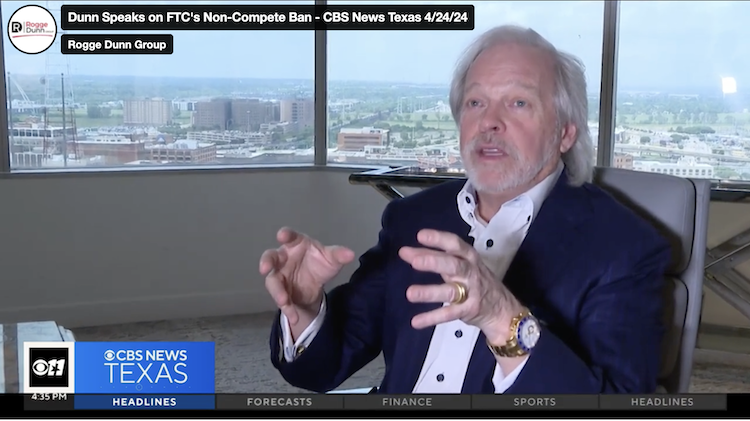By Nicole Nielsen
April 24, 2024 / 4:53 PM CDT / CBS Texas
DALLAS — Nearly one in five Americans are subject to a noncompete
clause at work, according to the Federal Trade Commission (FTC).
This means employees cannot leave their jobs to work for a competing
employer. The FTC voted 2-3 on Tuesday to approve a ban against new
and existing noncompete policies, which will take effect in 120 days.
The rule makes all noncompete clauses unenforceable, except for those
at a senior executive level.
Dallas employment attorney Rogge Dunn said the ban is significant
news for employees who lose their leverage when having to sign a
noncompete clause.
“Employees are ecstatic about this because it makes them more
marketable, and it forces their current company to pay them what they’re
worth. Otherwise, they will go down the street to their competition for
better pay,” Dunn said.
The FTC said the new rule could increase wages by nearly $300 billion
per year and boost career opportunities for about 30 million Americans.
However, the new rule faces challenges.
Within hours of the vote, the U.S. Chamber of Commerce announced it
would sue to block the ban on noncompete clauses.
In Dallas, G. Brint Ryan, CEO of a Global Tax Firm, filed a lawsuit
Tuesday in federal court for the Northern District of Texas against the
ban. CBS News Texas reached out for a statement Wednesday, in which
Ryan described the new ban as “unlawful.”
“There may be a world where the FTC kicks the can down the road and
says, let’s wait to see how this works out in court first,” Dunn said. He
expects the ban to be heavily challenged in court, possibly delaying
results.
Dunn predicts employees will ultimately win this battle.
“If I had to predict, I think it will be upheld in court. Once it goes into
effect, you will see the floodgates open. I think you will see tens of
thousands of employees move and say ‘I dare you to sue me,'” Dunn
said.

Nicole Nielsen joined the CBS 11 news team in June 2020. Born and raised in Keller, Nicole is a North
Texas native who is thrilled to work for the station she grew up watching.
